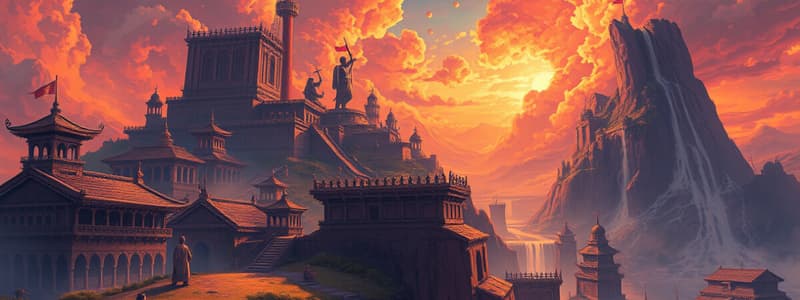Podcast
Questions and Answers
What was a significant philosophical movement of the 17th to 18th century that emphasized reason and individual rights?
What was a significant philosophical movement of the 17th to 18th century that emphasized reason and individual rights?
The Age of Enlightenment.
Identify one major socio-economic transformation that occurred during the Industrial Revolution.
Identify one major socio-economic transformation that occurred during the Industrial Revolution.
The shift from agrarian economies to industrialized ones.
What were the main causes of World War I?
What were the main causes of World War I?
Nationalism, militarism, and complex alliances.
Describe the ideological conflict that characterized the Cold War era.
Describe the ideological conflict that characterized the Cold War era.
Name one significant consequence of the post-Cold War era.
Name one significant consequence of the post-Cold War era.
What social movements have significantly shaped modern societies according to the themes of modern history?
What social movements have significantly shaped modern societies according to the themes of modern history?
What period is defined by the revival of classical learning and the emergence of humanism?
What period is defined by the revival of classical learning and the emergence of humanism?
During which century did colonialism and imperialism particularly expand European powers into non-European territories?
During which century did colonialism and imperialism particularly expand European powers into non-European territories?
What revolution in 1789 challenged existing political structures in France?
What revolution in 1789 challenged existing political structures in France?
How did technological advancements impact warfare in modern history?
How did technological advancements impact warfare in modern history?
Flashcards are hidden until you start studying
Study Notes
Modern History
Definition
- Refers to the period from the late 15th century to the present.
- Characterized by significant global changes in politics, economics, culture, and technology.
Key Eras
-
Renaissance (14th - 17th Century)
- Revival of classical learning and arts.
- Humanism emerged, emphasizing individual potential.
-
Age of Enlightenment (17th - 18th Century)
- Intellectual movement advocating reason, science, and individual rights.
- Key figures: Voltaire, Rousseau, Locke.
-
Industrial Revolution (18th - 19th Century)
- Shift from agrarian economies to industrialized ones.
- Innovations in manufacturing, transportation, and technology.
-
Colonialism and Imperialism (19th Century)
- Expansion of European powers into Africa, Asia, and the Americas.
- Exploitation of resources and indigenous populations.
-
World Wars (20th Century)
- World War I (1914-1918): Causes included nationalism, militarism, and complex alliances.
- World War II (1939-1945): Resulted from unresolved issues from WWI; led to significant geopolitical changes.
-
Cold War Era (1947-1991)
- Ideological conflict between the USA (capitalism) and the USSR (communism).
- Major events: Korean War, Cuban Missile Crisis, Vietnam War.
-
Post-Cold War (1991 - Present)
- Emergence of globalization and digital technology.
- Rise of terrorism, environmental issues, and shifts in global power dynamics.
Significant Themes
- Nationalism: Rise of nation-states and movements for independence (e.g., India, African nations).
- Revolutions: French Revolution (1789), Russian Revolution (1917), and other uprisings that challenged existing political structures.
- Social Movements: Civil rights, feminism, and LGBTQ+ rights have shaped modern societies.
- Technological Advancements: Impact on society, economy, and warfare (e.g., internet, nuclear technology).
Impacts
- Transformation of social structures and class dynamics.
- Major shifts in global power and the rise of new superpowers (e.g., China).
- Ongoing debates about human rights, democracy, and governance.
Definition
- Modern history spans from the late 15th century to the present, marking a period of profound global transformations across multiple domains.
Key Eras
-
Renaissance (14th - 17th Century)
- Marked by a revival of classical education and arts, emphasizing humanism and individual potential.
-
Age of Enlightenment (17th - 18th Century)
- Focused on reason, scientific thought, and individual rights. Influential thinkers included Voltaire, Rousseau, and Locke.
-
Industrial Revolution (18th - 19th Century)
- Transition from agrarian economies to industrial ones, characterized by significant innovations in manufacturing and transportation.
-
Colonialism and Imperialism (19th Century)
- European powers expanded into Africa, Asia, and the Americas, leading to resource exploitation and the subjugation of indigenous peoples.
-
World Wars (20th Century)
- World War I (1914-1918): Driven by nationalism, militarism, and entangled alliances.
- World War II (1939-1945): Consequence of unresolved WWI issues, drastically altering global geopolitics.
-
Cold War Era (1947-1991)
- Ideological standoff between the USA (capitalist) and USSR (communist). Key events included the Korean War, Cuban Missile Crisis, and Vietnam War.
-
Post-Cold War (1991 - Present)
- Growth of globalization and digital technologies; emergence of new terrorism, environmental challenges, and changing global power structures.
Significant Themes
-
Nationalism
- The rise of nation-states and independence movements, notably in regions like India and several African nations.
-
Revolutions
- Major uprisings such as the French Revolution (1789) and Russian Revolution (1917) that challenged existing political authorities.
-
Social Movements
- Movements for civil rights, feminism, and LGBTQ+ rights playing pivotal roles in shaping contemporary society.
-
Technological Advancements
- Innovations impacting society, economics, and warfare, including the internet and nuclear technology.
Impacts
- Change in social structures and class dynamics, leading to new societal norms.
- Shift in global power dynamics, with the emergence of new superpowers like China.
- Ongoing discourse around human rights, democracy, and governance in the modern world.
Studying That Suits You
Use AI to generate personalized quizzes and flashcards to suit your learning preferences.




